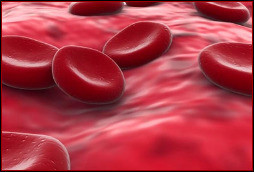A study of the use of epoetin biosimilars in the therapeutic management of anaemia secondary to chemotherapy in haematology and oncology has shown the biosimilars to be effective and well tolerated in the management of chemotherapy-induced anaemia in patients with solid tumours, lymphoma and myeloma [1].
Anaemia is a common complication of chemotherapy treatment. The ORHEO (place of biOsimilaRs in the therapeutic management of anaemia secondary to chemotherapy in HaEmatology and Oncology) study was an observational, longitudinal, multicentre study performed in France to evaluate the efficacy and safety of biosimilar epoetins for the treatment of chemotherapy-induced anaemia in the clinical setting.
The trial, which was carried out between October 2009 and August 2011, included 2,333 patients aged 18 years and older with chemotherapy-induced anaemia (haemoglobin [Hb] < 11 g/dL) in association with solid tumours, lymphoma or myeloma. Almost all (99.9%) of patients received the epoetin zeta biosimilar Retacrit (Hospira). The remaining three patients received Binocrit (epoetin alfa, Sandoz). The median dose of biosimilar epoetin was 30,000 IU/week during the course of the study. Most patients (99.7%) received biosimilar epoetin via the subcutaneous route and almost all (97.97%) received single weekly biosimilar epoetin injections.
The primary objective of the study was to observe response to treatment with an epoetin biosimilar with respect to the change in Hb levels over a 6-month period. Secondary objectives included changes in biological indicators such as Hb, haematocrit, reticulocytes, serum iron, ferritin and blood pressure; disease outcome and the safety profile of epoetin biosimilars, also over a 6-month period.
Mean baseline Hb was 9.61 g/dL, with 35.6% of patients having moderate anaemia (Hb 8-9.5 g/dL). Hb response was achieved in 81.6% and 86.5% of patients at 3 and 6 months, respectively. Overall mean change in Hb level was 1.52 +/- 1.61 and 1.72 +/- 1.61 g/dL at 3 and 6 months, respectively.
The overall rate of treatment-related adverse events was similar to that reported previously for epoetin zeta (10.4%). Transfusion and thromboembolic event rates were 9.4% and 2.4% at 3 months, and 5.8% and 1.5% at 6 months, respectively. The rate of thromboembolic events (3.55%) was lower than reported previously for epoetin zeta (4.2%) and epoetin alfa (4.0%).
The authors concluded that this study, which was the largest of its type, demonstrated that epoetin zeta is well tolerated and efficacious in treating anaemia in cancer patients with chemotherapy-induced anaemia.
Conflict of interest
Several of the authors of the research paper [1] reported conflicts of interest, including having received research support from, participated in advisory panels/boards or acted as consultants for Amgen, Astellas, Bristol-Myers Squibb, Celgene, Genzyme, Hospira, MSD, Mundipharma, Novartis, Octapharma, Pfizer, Roche, Sandoz and/or Teva. For more details see [1]. H Albrand is an employee of Hospira France.
Editor’s comment
If you are interested in contributing a research paper in a similar area to GaBI Journal, please send us your submission here.
Related articles
Biosimilars of epoetin alfa
Biosimilar epoetin shows good safety profile in post-authorization study
Positive post-marketing data for biosimilar epoetin
Reference
1. Michallet M, et al. BiOsimilaRs in the management of anaemia secondary to chemotherapy in HaEmatology and Oncology: results of the ORHEO observational study. BMC Cancer. 2014;14(1):503. [Epub ahead of print]
Permission granted to reproduce for personal and non-commercial use only. All other reproduction, copy or reprinting of all or part of any ‘Content’ found on this website is strictly prohibited without the prior consent of the publisher. Contact the publisher to obtain permission before redistributing.
Copyright – Unless otherwise stated all contents of this website are © 2014 Pro Pharma Communications International. All Rights Reserved.








 0
0











Post your comment